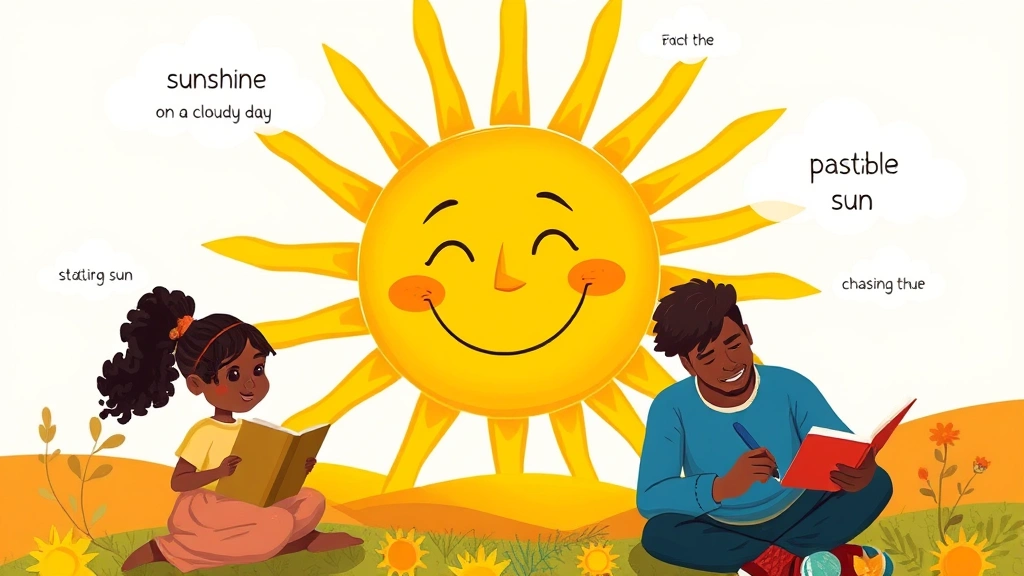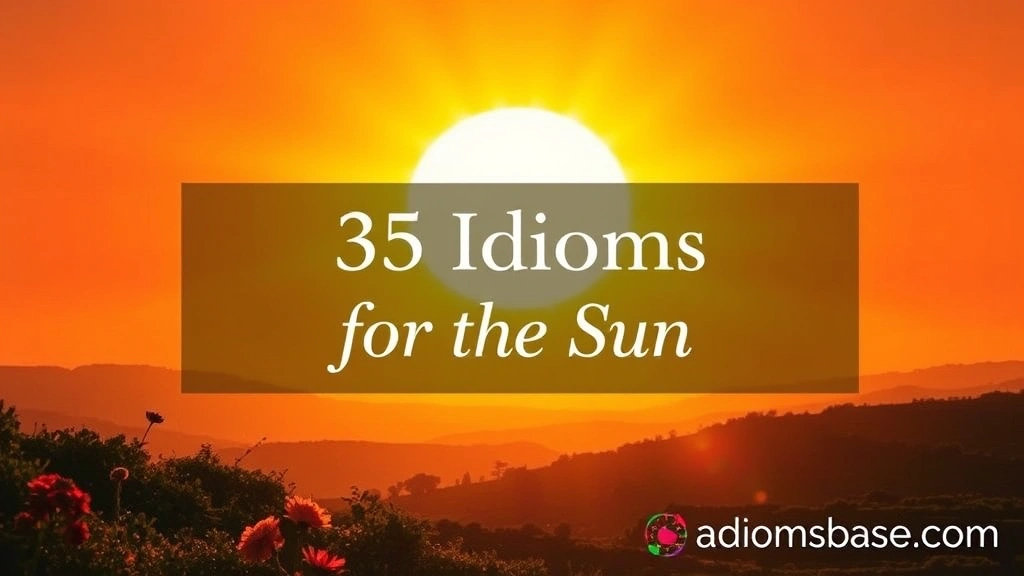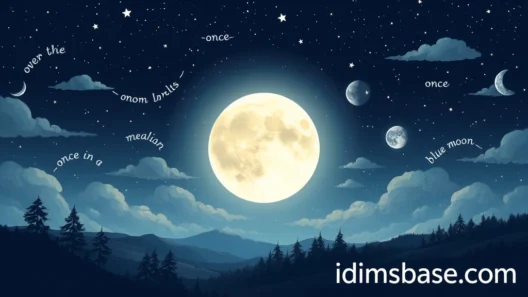Hello there, sunshine! Have you ever noticed how the sun, that brilliant star warming our planet, isn't just a celestial body but also a muse for countless expressions in the English language? It's true! From bright mornings to scorching afternoons, the sun inspires idioms that add zest and color to our conversations.
Imagine trying to describe a fantastic day without saying "sunny," or talking about a new beginning without mentioning the "dawn." It’s almost impossible! Idioms are like secret codes that native speakers effortlessly understand, making communication richer and more nuanced. But for those learning English, they can sometimes feel like a puzzle. That’s where we come in!
We're about to embark on a delightful journey through 35 incredible idioms inspired by the sun. Get ready to illuminate your vocabulary and shine brighter in your English conversations. You'll discover how these phrases are used, what they truly mean, and how you can sprinkle them into your daily dialogue. Let's chase away the clouds and soak up some linguistic rays!
35 Brilliant Sun-Inspired Idioms
Ready to brighten your English vocabulary? Here are 35 fantastic idioms that revolve around our favorite star, the sun!
Idioms About Light and Brightness
These idioms often refer to clarity, happiness, or success.
- A place in the sun: This idiom means a favorable or advantageous position, often achieved after a struggle.
- Example: "After years of hard work, she finally found her place in the sun as a successful architect."
- All sunshine and rainbows: Describes a situation that is perfect and without problems, often used ironically to imply the opposite.
- Example: "You think starting a business is all sunshine and rainbows? Think again!"
- Black as pitch/night without sun: Extremely dark, utterly without light.
- Example: "The cave was black as pitch without sun; I couldn't see my hand in front of my face."
- Bright as the sun: Extremely bright or intelligent.
- Example: "Her smile was bright as the sun, lighting up the whole room."
- Catch some rays: To sit or lie in the sun, especially to get a suntan.
- Example: "I'm heading to the beach this weekend to catch some rays."
- Chase the sun: To travel to warmer climates, often avoiding winter.
- Example: "After retirement, they decided to chase the sun and live in Florida."
- Come rain or shine: Whatever happens; regardless of the circumstances.
- Example: "I'll be there for you, come rain or shine."
- Everything under the sun: Everything imaginable; a very wide range of things.
- Example: "He collects everything under the sun, from stamps to antique furniture."
- Full of the joys of spring/sunshine: Very happy and energetic.
- Example: "She woke up full of the joys of sunshine, ready for the day."
- Happy as a clam (at high tide/in the sun): Extremely happy and content.
- Example: "He was happy as a clam in the sun, enjoying his vacation."
- Have your day in the sun: To experience a period of success, recognition, or fame.
- Example: "Every artist hopes to have their day in the sun."
- Make hay while the sun shines: To take advantage of favorable circumstances while they last.
- Example: "The market is booming, so we need to make hay while the sun shines."
- Nothing new under the sun: A phrase suggesting that everything that happens has happened before; there are no truly original ideas or events.
- Example: "Another celebrity scandal? Well, nothing new under the sun."
- One swallow does not make a summer/sun: A single positive event does not mean that a trend or pattern is established.
- Example: "Just because you got one good grade doesn't mean you can stop studying; one swallow does not make a summer."
- Rise with the sun: To wake up very early in the morning, at sunrise.
- Example: "Farmers often rise with the sun to start their work."
- See the sun: To be alive or to exist; to experience life.
- Example: "I hope to see the sun rise over the Himalayas someday."
- Shine like the sun: To be exceptionally brilliant, successful, or beautiful.
- Example: "Her performance on stage made her shine like the sun."
- Soak up the sun: To enjoy the warmth and light of the sun, often for relaxation.
- Example: "I love spending my afternoons soaking up the sun by the pool."
- There's nothing new under the sun: (See "Nothing new under the sun")
- Example: "Don't stress about coming up with a completely original idea; there's nothing new under the sun."
- Under the sun: In existence; anywhere on Earth.
- Example: "They discussed every topic under the sun during their long conversation."
- Walk on sunshine: To feel extremely happy and joyful.
- Example: "After getting the job offer, she felt like she was walking on sunshine."
Idioms About Time and Cycles
These idioms often refer to beginnings, endings, or the passage of time.

- Beyond the sunset: After death; in the afterlife.
- Example: "He believed that true peace lay beyond the sunset."
- From sunrise to sunset: All day long; from morning till night.
- Example: "They worked tirelessly from sunrise to sunset to finish the project."
- Go down like the setting sun: To decline or fail gracefully or inevitably.
- Example: "His political career went down like the setting sun after the scandal."
- Into the sunset: Towards an ending or retirement, often implying a peaceful or romantic departure.
- Example: "The old cowboy rode his horse into the sunset."
- Never let the sun set on your anger: Don't go to bed angry; resolve conflicts before the day ends.
- Example: "My parents always advised us to never let the sun set on our anger."
- The sun never sets on the British Empire (historical): A historical phrase indicating the vast global reach of the British Empire, where at least one part of it was always in daylight. Now used to describe any large, widespread entity.
- Example: "With offices in every major city, it seems the sun never sets on their global corporation."
- Wait for the sun to shine: To wait for better times or more favorable conditions.
- Example: "We're just waiting for the sun to shine on our business again after this recession."
- When the sun comes out: When things improve or become better after a difficult period.
- Example: "We've had a tough year, but I'm optimistic about when the sun comes out for us."
Idioms About Challenges and Difficulties
These idioms often relate to tough times or intense situations.
- Beat the sun: To get up very early, before sunrise.
- Example: "We had to beat the sun to get to the airport on time."
- Sunstroke: A condition caused by too much exposure to the sun, often used metaphorically for a momentary lapse in judgment.
- Example: "He must have had a bit of sunstroke; his decision made no sense."
- Under the sun (in a negative sense): Exceedingly hot or oppressive.
- Example: "It's too hot under the sun to work outside today."
- With the sun in one's eyes: Unable to see clearly due to bright sunlight; sometimes used metaphorically for being disadvantaged.
- Example: "The tennis player struggled with the sun in her eyes during the final set."
- You are my sunshine: An affectionate term used to tell someone they bring happiness and brightness into your life.
- Example: "My daughter truly is my sunshine; she brightens every day."
- Worship the sun: To adore or idolize someone or something; also literally to bask in the sun.
- Example: "Some people just worship the sun and spend all their free time at the beach."
Phew! That's quite a collection, isn't it? From the first rays of dawn to the peaceful glow of sunset, the sun truly colors our language in countless beautiful ways.
Key Takeaways
You've just explored a fascinating array of sun-inspired idioms, and here are the shining points to remember:
- Idioms add color: They make English more vibrant and expressive, allowing you to convey complex ideas concisely.
- Context is key: The meaning of an idiom often depends on the surrounding words and situation.
- Practice makes perfect: The best way to master these idioms is by hearing them, reading them, and trying to use them yourself. Don't be afraid to experiment!
- Cultural insights: Idioms often reflect cultural values and observations, like the importance of hard work ("make hay while the sun shines") or the cycle of life.

Remember, language learning is a journey, not a destination. Each new idiom you learn is like a tiny ray of sunshine, illuminating your path to fluency!
Frequently Asked Questions (FAQs)
Still have some burning questions about sun idioms? Let's shed some light on them!
H4 What is an idiom, anyway?
An idiom is a phrase or expression whose meaning cannot be understood from the ordinary meanings of its words. For example, "kick the bucket" doesn't literally mean to kick a bucket; it means to die. Idioms are a crucial part of natural language and are often unique to specific cultures or languages. They add richness and nuance to communication.
H4 Why are there so many idioms about the sun?
That's a fantastic question! The sun is one of the most fundamental and universally recognized elements in human existence. It dictates our days and nights, influences seasons, and is essential for life itself. Historically, the sun has been worshipped, feared, and celebrated. Its constant presence and powerful effects on our world make it a natural source of inspiration for countless metaphors and expressions across many languages, not just English. Its cyclical nature (sunrise, sunset) also lends itself to idioms about beginnings, endings, and the passage of time.
H4 How can I remember all these idioms?

Learning idioms can feel overwhelming, but here are some tips to help you remember them:
- Contextual learning: Instead of memorizing lists, try to learn idioms in context. Read articles, watch movies, or listen to songs where they are used.
- Create your own sentences: Actively use the idioms in sentences that are relevant to your own life. This makes them more personal and memorable.
- Visualize: Many idioms create a strong mental image. Try to picture what the idiom describes (e.g., "walking on sunshine").
- Group them: As we did in this article, group idioms by theme (e.g., happiness, time, challenges).
- Review regularly: Like any new vocabulary, idioms need regular review to stick in your long-term memory.
- Use flashcards: Write the idiom on one side and its meaning and an example sentence on the other.
H4 Are sun idioms used in formal or informal settings?
Most sun idioms are quite versatile! Many, like "make hay while the sun shines" or "everything under the sun," are commonly used in informal conversations. However, some can also appear in more formal writing or speeches to add color and impact, provided they fit the tone. For example, "have your day in the sun" could easily be used in a newspaper article. It's always a good idea to consider your audience and the context when deciding whether an idiom is appropriate.
H4 Can I make up my own idioms?
While you can technically combine words in new ways, for something to become a recognized "idiom," it needs to be widely understood and used by a community of speakers. Idioms evolve organically over time through common usage. So, while you can be creative with language, inventing a new idiom that truly catches on is a rare and difficult feat! It's better to focus on mastering the existing ones first.
H4 Do other languages have idioms about the sun?
Absolutely! The sun is a universal symbol, and nearly every language has its own unique set of idioms inspired by it. For example, in Spanish, "estar más claro que el agua" (to be clearer than water) implies great clarity, similar to "bright as the sun" in English. Exploring sun idioms in other languages can be a fascinating way to understand cultural perspectives and how different societies view this essential celestial body.
We hope this journey through sun-inspired idioms has been as bright and enlightening for you as the sun itself! Keep shining, keep learning, and don't forget to sprinkle these lovely phrases into your English conversations. You'll be speaking like a native in no time!






